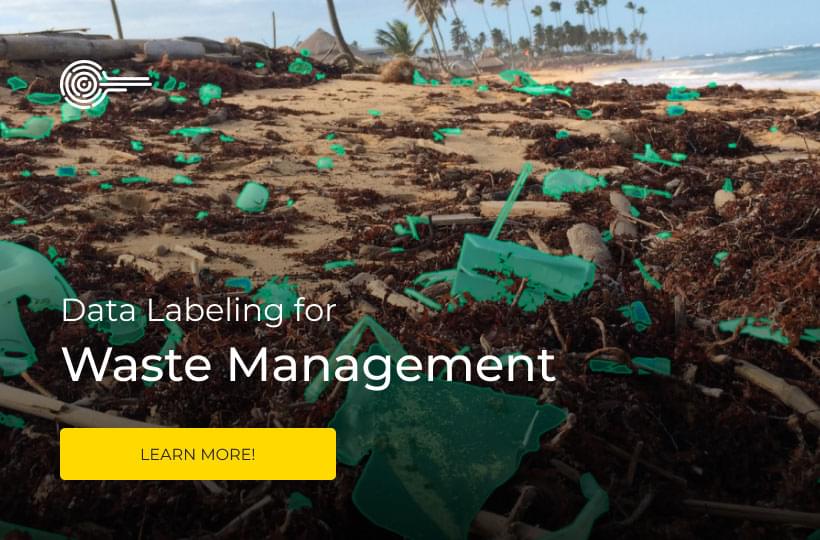TOP-5 industries where data annotation precision is critically

Data annotation is a process of labeling data to make it understandable for machines. It is a crucial step in machine learning and artificial intelligence as it helps algorithms learn from data and make accurate predictions. The precision of data annotation is of utmost importance as it directly impacts the performance of the models. In this article, we will explore the top 5 industries where data annotation precision is critically important.
Firstly, we will delve into the healthcare industry where accurate medical records are essential for providing quality care to patients. Next, we will discuss how data annotation is enhancing road safety in the autonomous vehicle industry. We will also explore how data annotation is improving customer experience in the retail industry and enhancing fraud detection in the finance industry. Lastly, we will look at how data annotation is improving crop yield and quality in the agriculture industry.
In each of these industries, data annotation plays a crucial role in improving efficiency, accuracy, and safety. As we move towards a more data-driven future, the importance of data annotation precision will only continue to grow.

Introduction To Data Annotation
Data Annotation is a critical process for many businesses, particularly those that rely on supervised machine learning algorithms. Such algorithms are designed to learn from labeled data, and creating accurate labels with precision and adherence to scope parameters is instrumental in achieving the desired goal. In recent years, the market for AI and Machine Learning relevant data preparation solutions has grown significantly, with an expected value of $3.5 billion by 2024.
One industry that benefits substantially from data annotation is Precision Agriculture. By using AI technology to detect issues such as plant diseases or pests' presence accurately, farmers can improve crop quality while reducing losses due to issues that affect yield. Agricultural companies like Anolytics specialize in providing agricultural data annotation services like weed detection or measurement of leaf area index.
Data annotation experts must continually adapt to new challenges since industries' applications have different use cases requiring tailored solutions specific to each sector's challenges. However, regardless of the industry involved - whether it be healthcare or agriculture - one theme remains constant: precise data annotation services are crucial to ensure satisfying business outcomes based on reliable training models.
Importance Of Data Annotation Precision
Data annotation precision is a critical component of ensuring the success of artificial intelligence (AI) or machine learning (ML) projects. The process of labeling data with relevant tags makes it easier for computers to understand and interpret the information, and ultimately make accurate predictions based on that information. Inaccurate data annotation results in inaccurate predictions, which can have negative consequences such as misdiagnosis in healthcare or improper categorization in e-commerce.
Precision is paramount in data annotation. This means that the annotations must be as accurate and specific as possible, leaving no room for subjective interpretation. For example, if annotating medical images to detect tumors, the annotations should clearly indicate where the tumor is located within the image rather than using vague descriptions. Without precise annotations, an AI or ML model will struggle to classify and distinguish between different categories of data.
Several industries rely heavily on data annotation precision to function efficiently. In healthcare, precise data annotation can save lives by accurately diagnosing diseases and conditions early on. Similarly, insurance companies use precise data annotation to determine risk assessments accurately and prevent fraudulent claims effectively. Additionally, retail and e-commerce companies depend heavily on accurate data annotation when categorizing items for sale online.
Healthcare Industry: Ensuring Accurate Medical Records
The importance of data annotation in the healthcare industry cannot be overemphasized. Lack of precision in annotating medical data can lead to life-threatening consequences. However, accurate data annotation helps machine learning models diagnose diseases accurately and improve patient outcomes.

According to recent market research, the global healthcare AI market is expected to grow exponentially from 2019 to 2026, with a CAGR of 46.21%. At the same time, precise annotation is essential for creating an infrastructure that converges massive amounts of healthcare data necessary for precision medicine.
While AI technology improves healthcare diagnoses and treatment efficacy, human intervention still plays a critical role in maintaining accuracy in medical records. Healthcare professionals must recognize that AI is not meant to replace human expertise but rather support it by providing well-optimized and well-labeled training datasets.
As the COVID-19 pandemic swept through the world, there was a clear need for technology capable of detecting hotspots while predicting incoming patients' inflow rates. The medical industry has embraced new technologies such as data annotation tools that enable intelligent responses against unprecedented events like pandemics.
Autonomous Vehicles: Enhancing Road Safety
Data annotation precision is a critical factor for the safety and performance of autonomous vehicles. High-precision lane line recognition and object measurement are vital for accurate perception of surroundings, making data annotation essential in the development of these technologies.
To achieve high-quality results, it's important to ensure that the data used for autonomous driving solutions is thoroughly annotated. However, the quality of AI data varies greatly across different industries, emphasizing the need for high-quality annotation. Proper annotation helps vehicles identify different road conditions and unanticipated obstacles effectively to provide more reliable and consistent performance.
Video annotation | Keymakr
Various types of data annotations are used in autonomous driving solutions; 2D bounding boxes and lane marking are among them. Effective annotations translate into better algorithms which can help reduce accidents caused by human error resulting in lower accident rates as compared to traditional driving approaches. In summary, proper data annotation plays a crucial role in enhancing road safety in the steadily growing industry towards widespread adoption of autonomous vehicles technology.
Retail Industry: Improving Customer Experience
The retail industry places a high value on customer experience, and it's easy to see why. That's because data about customers' preferences can help retailers make decisions that improve the customer experience in both online and in-store environments. For instance, understanding how customers navigate through a website or store is crucial to creating a seamless shopping experience from start to finish.
One way retailers can harness customer data is by using AI and data annotation services, which can analyze large amounts of customer behavior data to identify patterns, preferences, and needs automatically. These services provide accurate and consistent results with minimized errors.
Improving search engine quality is another way retailers can enhance the customer experience; this includes optimizing product descriptions, images, video content, etc., to ensure they appear at the top of related search queries. This not only helps customers find what they're looking for faster but also improves their perception of the brand.
Today's trends show that modern retail prioritizes user experiences over price point or physical products alone. Data annotation is necessary for machine learning (ML) development in various sectors of retail including chatbots for better customer interactions that feature better recommendations based on past purchases; optimally utilized smarter inventory management and preventive maintenance through predictive analytics are other critical applications worth noting about data annotation utilization in providing more meaningful insights into shopper behavior while removing unnecessary elements churned out during automated analyses.
Finance Industry: Enhancing Fraud Detection
In today's fast-moving financial industry, legacy fraud management approaches are no longer sufficient. According to estimates, global fraud has caused more than $5 trillion in financial losses. Therefore, financial institutions must integrate advanced analytics and automation into their systems for effective fraud prevention, detection, and remediation.
AI and machine learning integration can significantly enhance the effectiveness of fraud detection and compliance in the finance industry. Precision and recall evaluation are vital when assessing credit card fraud detection performance. Techniques such as entity resolution, network analysis, and text clustering have also proven valuable in detecting and preventing fraudulent activities.
To support diverse financial business needs such as fraud detection, SaaS and On-Premises data annotation solutions have become popular. They provide financial institutions with an automated process for data tagging by expert annotators from various domains.
Overall, integration of advanced analytics techniques such as AI/machine learning into legacy systems is critical for the evolving finance industry to detect fraudulent activities promptly.

Agriculture Industry: Improving Crop Yield And Quality
Precision agriculture is a modern farming practice that leverages advanced technology to detect diseases, pests, poor plant nutrition, and weeds. It improves resource use efficiency, productivity, quality, profitability and sustainability of agricultural production. As a result, precision agriculture has become critical in the agriculture industry for improving crop yield and quality.
Modern precision agriculture relies heavily on Artificial Intelligence (AI) technology to analyze samples such as soil or plant health indicators. Image annotation plays an essential role in generating datasets that allow computer vision models to operate in real-world situations.
Certified seeds are recommended for planting as they increase crop yield on farmlands. Once crops have matured into maturity stages where data collection can be done easily through visual inspection or sensor readings tools, farmers can monitor their harvest based on reliable yield data. Yield predictors enable companies to plot raw material purchases, influence premiums for crop insurance and provide crucial data points for federal state and local governments.
Future Of Data Annotation In Industries
The future of data annotation in industries is bright, with the market for AI and machine learning relevant data preparation solutions expected to grow to $3.5 billion by 2024. Data annotation, especially crowdsourced data annotation, where a large network of annotators marks data through an online platform, is becoming increasingly critical for industrial projects that depend on labeled information.
Each industry uses data annotation differently; some use one method while others use a combination. In terms of trends, image, video, and text data are paving the way for innovation in this area. A prominent player in using annotated information is healthcare as they are becoming more reliant on it for things such as medical diagnoses.
Defining the scope and parameters of a project helps achieve successful completion when it comes to precision labeling from experienced service providers like Mighty AI or Amazon Mechanical Turk. The global market size for annotation tools is anticipated to expand at a compound annual growth rate (CAGR) of 26.5% from 2023 to 2030 with services expanding at CAGR of 26.6% during the same period.

Conclusion
In conclusion, data annotation precision is critically important in several industries, including healthcare, autonomous vehicles, retail, finance, and agriculture. Accurate and reliable data annotation can significantly enhance the safety, efficiency, and effectiveness of various processes and systems. As industries continue to rely more heavily on data and machine learning, the importance of data annotation will continue to grow.
Therefore, it is crucial for businesses to invest in high-quality data annotation services and tools, and to ensure that their data annotation processes are accurate and consistent. With the right approach to data annotation, businesses can unlock new opportunities for growth, innovation, and success.



